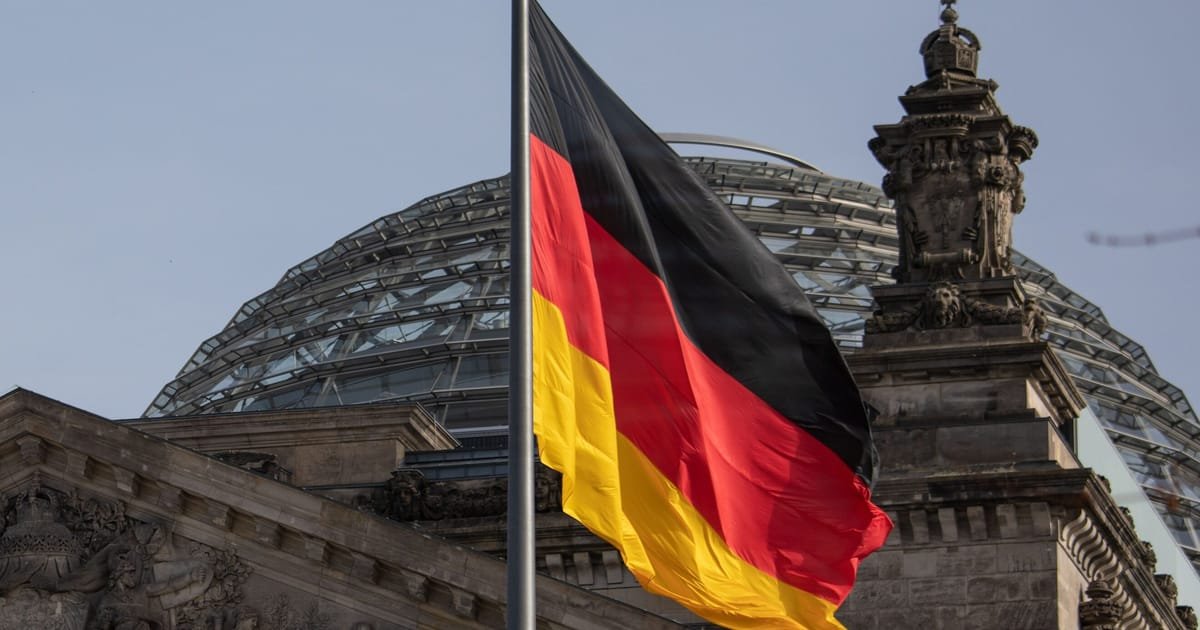
The plans have already led to fierce rows between politicians | David Gannon/AFP through Getty Photographs
BERLIN — The fats years are over.
After a decade of spending will increase, the German authorities on Wednesday adopted plans to chop its price range for subsequent 12 months by €30.6 billion, affecting areas from well being to childcare and public transport — sparking fierce political battles inside the governing coalition and throughout the political divide.
Ballooning public debt from the coronavirus pandemic and the power disaster triggered by Russia’s struggle in Ukraine meant that drastic cuts have been now unavoidable, Finance Minister Christian Lindner mentioned. He insisted the nation would return to stricter fiscal insurance policies that respect the nation’s constitutionally enshrined debt brake that limits spending.
“We’re solely in the beginning of the fiscal turnaround,” Lindner mentioned. “We have to free the state from debt with out burdening folks and companies with extra taxes.”
Declining tax earnings and knowledge final month displaying that Germany has fallen into recession have additional lowered Lindner’s room for maneuver. The cuts will have an effect on all authorities ministries besides these of protection and labor and welfare.
The plans have already led to fierce rows between politicians from the three-party ruling coalition of Chancellor Olaf Scholz’s Social Democrats (SPD), the Greens and Lindner’s Free Democratic Get together (FDP).
Scholz got here out combating on Wednesday. “The price range is after all challenged by the truth that many have turn out to be accustomed lately to the big spending,” he informed lawmakers in Berlin. However “we are going to now once more draw up budgets that don’t try to fight crises with these further credit-financed funds, however which can be geared very particularly to the way forward for our nation.”
‘Brake on the long run’
Labor unions criticized the proposals. Lindner’s insistence on returning to the debt brake, which restricts borrowing to a fraction of GDP, is placing “a brake on the long run,” particularly at a time of a number of challenges such because the inexperienced transition and social points, Stefan Körzell of the German Federation of Commerce Unions, mentioned.
The cuts are a lot greater than an preliminary determine of €18 to €22 billion that the Greens Economic system Minister Robert Habeck talked about final month.
Nonetheless, the federal government nonetheless plans €16.6 billion of recent debt subsequent 12 months — the utmost quantity that’s allowed beneath the debt brake. Parliament can be requested to approve subsequent 12 months’s price range within the fall.
The Greens are notably upset about price range cuts imposed on Household Minister Lisa Paus, which they are saying are accountable for the federal government having to chop again on Germany’s beneficiant allowance that allows {couples} to take as much as 14 months of parental depart.
The dispute escalated a lot in latest days that lawmakers from the Greens and FDP shared confidential authorities letters on Twitter in an effort to indicate who needs to be blamed for the cuts. For his half, Lindner took to Twitter to inform Paus that she might even have made financial savings in different areas.
German Chancellor Olaf Scholz | Frederick Florin/AFP through Getty Photographs
Whereas solely extremely paid households with a yearly earnings over €150,000 can be affected by the cuts and can now not have entry to the childraising allowance, the Greens are crucial as a result of they concern this may cut back the variety of males with excessive salaries taking a break from work, placing a bigger burden of childcare again onto girls.
The opposition additionally attacked the plan. Mario Czaja, secretary-general of the center-right CDU, spoke of a “slap within the face of working mother and father that creates de facto a two-class society amongst hard-working households.”
However Scholz pressured his authorities stays dedicated to implementing one of many Greens’ key tasks — a fundamental allowance for kids from low-income households, slated to be launched in 2025 however with financing nonetheless unsure.
One other sector closely affected is well being. Karl Lauterbach, the well being minister, introduced his division would scrap a state subsidy for long-term care insurance coverage.
Schooling, trains, protection
Different areas affected by extreme spending cuts embody schooling, which is able to cut back the federal government’s means to finance pupil funds, and transport, that means that Berlin can present much less cash for renovating the nation’s ailing railway community.
Germany’s railway operator Deutsche Bahn has mentioned that it wants €45 billion of recent cash by 2027 for upgrades and to arrange for elevated passenger numbers — a authorities goal as Germany desires to encourage rail journey to chop again carbon emissions. Nonetheless, Lindner’s price range plans solely foresee about €12 billion for the years 2024-2027.
Though the federal government plans to faucet a particular local weather fund to pump extra money into the rail sector, it is unclear whether or not that fund could have adequate monetary energy to fulfil Deutsche Bahn’s wants, provided that it is also used to pay for different wants corresponding to a €10 billion subsidy for a brand new Intel chip plant in japanese Germany.
Germany’s protection price range can be spared from cuts subsequent 12 months and can enhance barely from €50 billion to just about €52 billion. Nonetheless, that enhance is forecast to cowl solely the elevated prices on account of inflation and it will not be adequate to pay for urgently wanted investments to spice up Germany’s army capabilities amid Russia’s struggle in Ukraine and Scholz’s proclaimed shift in overseas and protection coverage, the Zeitenwende.
For the second, Scholz mentioned that the federal government would faucet a €100 billion particular fund for army armament to pay for these investments and fulfil NATO’s purpose of spending a minimum of 2 p.c of financial output for protection as of subsequent 12 months.
But, it is nonetheless unclear how Germany desires to completely fulfil the NATO 2 p.c purpose as soon as that particular fund begins to run dry as of 2026.
“Please ask [Defense Minister Boris] Pistorius, how he desires to maintain NATO commitments” with these price range plans, mentioned Christian Mölling from the German Council on Overseas Relations.
Scholz argued in Parliament that in the long term, “we’ve to finance these [defense] expenditures from the [regular] price range.”





